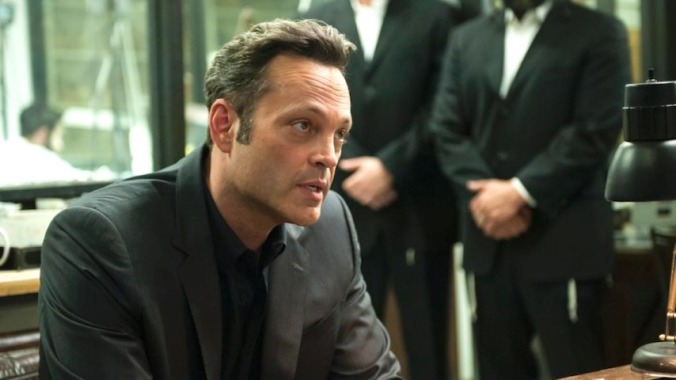The MVP: Vince Vaughn’s Turn in True Detective Season 2 Was the Perfect Choice for a Man in Search of Control
Subscriber Exclusive
Photo Courtesy of HBO
Editor’s Note: Welcome to The MVP, a column where we celebrate the best performances TV has to offer. Whether it be through heart-wrenching outbursts, powerful looks, or perfectly-timed comedy, TV’s most memorable moments are made by the medium’s greatest players—top-billed or otherwise. Join us as we dive deep on our favorite TV performances, past and present:

Which way, Vince Vaughn? The poster boy of turn-of-the-millennium comedies—Swingers, Dodgeball, Wedding Crashers—split his roles between outlandish comic turns and put-upon straight men, and was pretty great at both of them. These R-rated romps were male-skewing, immature, sometimes with a touch of welcome absurdity, but they seeped into the movie-going culture with such ease; thanks to their near-universal appeal (easy, low-brow laughs done by skilled performers), they showed longevity throughout the boom of HD home video and streaming.
But they don’t make those unsophisticated comedies anymore, or, at least, not in the same way anymore (Vaughn has some thoughts on why); what felt like easy charm in the 2000s felt hokey and lazy in the 2010s. Every time one of Vaugn’s early-2010s comedies tried to balance the schmaltzy sentimentality with rude comedy, it came across as tired—go on, tell us that Vaughn’s blank expression and half-hearted shrug on the Delivery Man poster actually sells you on watching the movie. The last Vince Vaughn comedy to rake in more than $100 million at the box office was Couples Retreat fifteen years ago.
But back to our opening question: as Hollywood neglected Vaughn’s aptitude for flitting between zany, oafish supporting parts and schlubby but sincere straight men, the actor was faced with new opportunities in the bloom of the Prestige TV age. Television was becoming the buzzy, laudable, and urgent stomping-ground for artists disillusioned with the limitations of Hollywood, with tons of self-serious dramatic roles available to whoever had something to prove. In many ways, the casting of Vince Vaughn as a gangster struggling to go straight in True Detective Season 2 is the archetype for performers itching for a comeback.
There are many contested explanations of when the “Prestige TV” golden age kicked off, but it was definitely underway when True Detective Season 1 aired in January 2014. Still, the Southern Gothic mystery that debuted the ambitious anthology series felt like a turning point; it had blockbuster-level hype, careful cinematic craft, and two big movie star leads (one of whom had not been a main cast member on TV since Cheers). Detective procedurals of this psychological caliber were rare: networks wanted to replicate it; actors wanted to be a part of it. 16 months after the first season, the Los Angeles-set gritty noir Season 2 premiered, where Vaughn’s gangster gets mixed up in the detective work of Colin Farrell, Rachel McAdams, and Taylor Kitsch.
The sophomore outing of True Detective is the black sheep of the series. Rolling out eight hours of detective antics on the same scale and quality as the explosively successful McConaughey and Harrelson season on such a short turnaround proved too difficult for lone-wolf showrunner and writer Nic Pizzolatto (joined in two episodes by co-writer Scott Lasser). The eight episodes looked worse, were more confusing, and generally irritated a lot of viewers, and the show took a four year hiatus until the more deserving Season 3.
But even though it collapses into utter confusion in the final two episodes, much of what’s good and bad about Season 2 is intact in the more lauded seasons: a thesis about how the best detective work is done by people with frayed, unstable psyches, and that systems are ill-fitted and unwilling to accept the truths that are uncovered. These threads are not only intact in Season 2, they’re the boldest they’ve ever been—and True Detective has never been a show to prioritize subtlety. There’s a messiness to the story that feels appropriate to the layered, tangled expanse of LA within which characters cross paths—after all, this is the most central and populous setting for any of the four True Detective seasons.
At times, Farrell makes us imagine a washed-up, self-loathing version of Sonny Crockett, his cool-as-ice Miami Vice character; Rachel McAdams is right at home with her character’s bitter, cynical view of LA crime; Taylor Kitsch is recompensed for the starring roles in flop movies he got after Friday Night Lights with a repressed, tight-jawed motorcycle cop character that sees him delivering the best performance of his career.
-

-

-

-

-

-

-

-

-

-

-

-

-

-

-

-

-

-

-

-

-

-

-

-

-

-

-

-

-

-

-

-

-

-

-

-

-

-

-

-








































